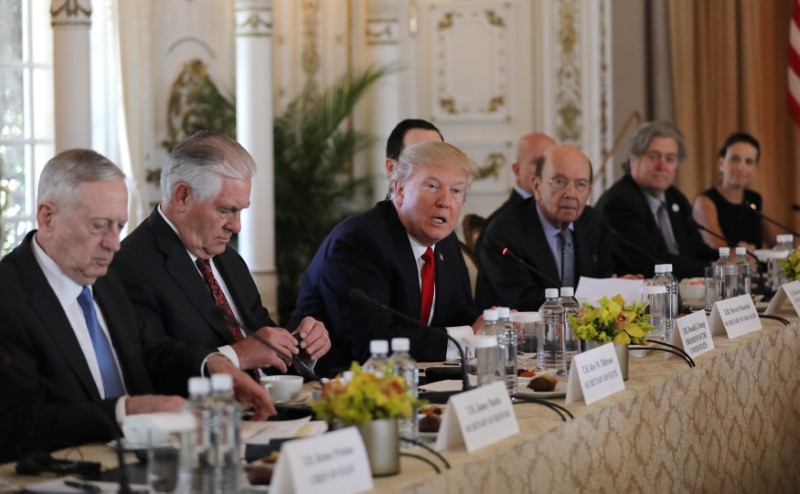By Patricia Zengerle
WASHINGTON (Reuters) - U.S. lawmakers want to emerge from briefings by the Trump administration on North Korea on Wednesday with something many think has been absent from the White House so far: a clear strategy for dealing with a major national security threat.
As a standoff escalated over the reclusive Asian nation's development of nuclear weapons and long-range ballistic missiles, President Donald Trump invited all 100 members of the Senate to attend a very unusual meeting at the White House with Secretary of State Rex Tillerson, Secretary of Defense Jim Mattis, Director of National Intelligence Dan Coats and Marine General Joseph Dunford, chairman of the Joint Chiefs of Staff.
While administration officials typically travel to the Capitol to brief lawmakers on national security issues, this time the entire Senate will hop on a bus to the White House where the four top officials will meet them at 3 p.m. EDT (1900 GMT).
"I really don't understand what is the president's game plan to get North Korea to change its calculation," Senator Ben Cardin, the ranking Democrat on the Senate Foreign Relations Committee, told reporters.
As for the Senate's field trip to the White House, the veteran lawmaker said, "I've never seen anything like it."
The same four officials will later go to Capitol Hill to brief the entire House of Representatives at 5 p.m. EDT (2100 GMT).
The briefings take place one day after North Korea celebrated the 85th anniversary of the founding of its army. While North Korea has in the past staged nuclear tests to mark the day, this year it conducted a live-fire exercise.
Hours before Wednesday's briefings, the top U.S. commander in the Pacific, Admiral Harry Harris, testified in Congress that the United States may need to strengthen its missile defenses given the North Korean threat.
100 DAYS INTO TRUMP PRESIDENCY
The briefings also come as Trump tries to put the best face on his first 100 days in office. He has signed executive orders to roll back Democratic policies but the period has been defined by an absence of any major legislative achievements.
Lawmakers, including some of Trump's fellow Republicans, have said his presidency has been marked by a lack of communication with Congress, partly because the administration has been slow to fill key posts and partly because Trump has been slow to develop policy positions.
Trump has discussed North Korea with U.N. ambassadors, increased U.S. military presence in the region, and leaned on China to pressure Pyongyang. Tillerson will chair a U.N. Security Council meeting on Friday to discuss tougher sanctions.
North Korea denounced the U.S. actions.
"There is a saying that those who are fond of playing with fire are destined to perish in the flames. The same can be said of the U.S.," a North Korean foreign ministry spokesman said in a statement.
Officials said the Trump administration has reviewed North Korean strategy, and the purpose of Wednesday's briefings was to present the results.
Lawmakers said they hoped the administration would seek to deal with Pyongyang through diplomacy rather than force.
"There is not a pretty military solution here," Cardin said.
Republican Senator Lindsey Graham said if Trump has a "red line", he needs to make that clear.

"North Korea will never stop their ambitions to deliver a nuclear weapon to America until the cost of doing so is greater than the benefit. And if China and North Korea both believe that President Trump will never allow that to happen, then you have a chance to peacefully solve this," he said.